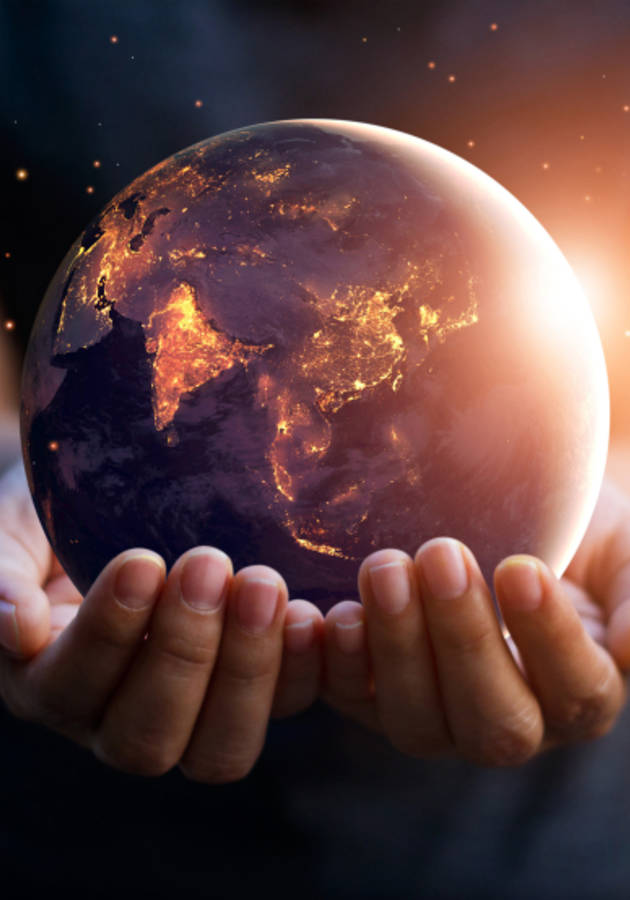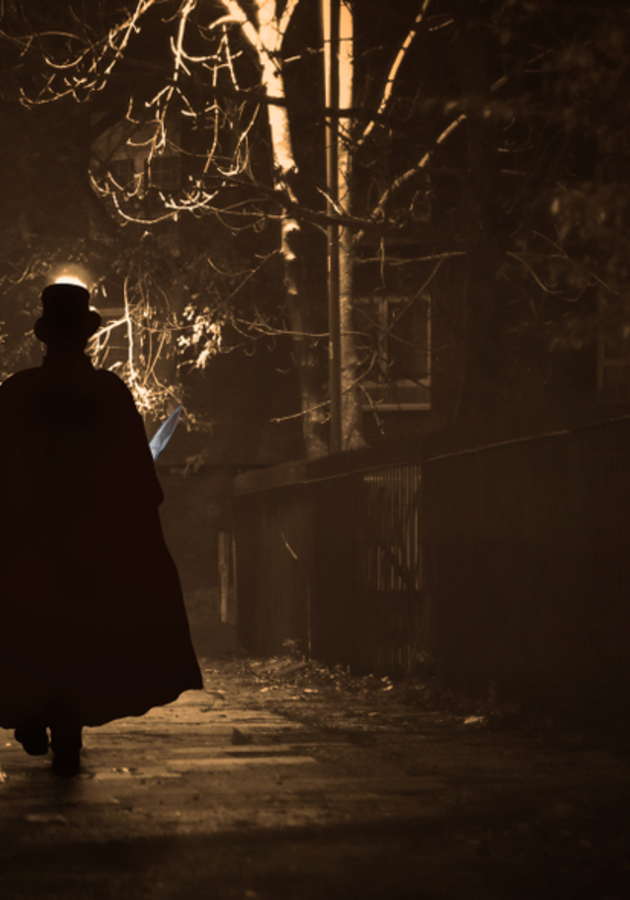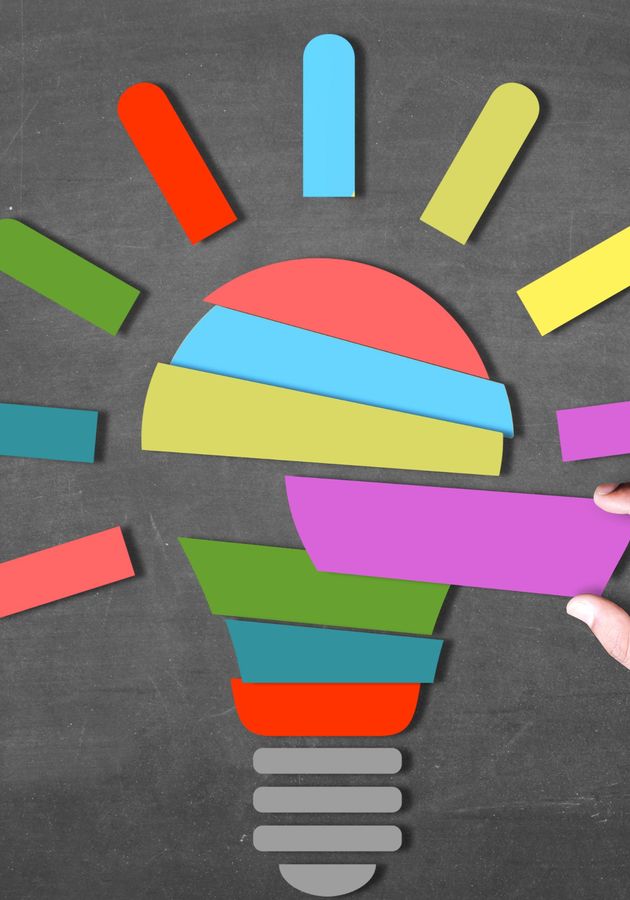In a world filled with fear, despair, anxiety, and depression, few are the ones who don’t crave at least a little harmony and some inner calm in their lives.
However, the constant race for accomplishments, the endless, dreadful competition that life has become, threatens to undermine the whole concept that is free time, and questions the very possibility of achieving peace on an almost daily basis. Is there some way out? Eckhart Tolle says there is.
A follow-up to the immensely successful “The Power of Now” – the bestseller that granted him an appearance on Oprah and made him a global superstar – ”A New Earth” is the fourth book by this German-born Canadian writer, "the most popular spiritual author in the United States" according to The New York Times.
And just like we’ve grown accustomed to expecting from Tolle, it is yet another book that questions many of the dogmas and doctrines society casually imparts on us, one whose mission is well beyond transforming a single person.
“This book’s main purpose is not to add new information or beliefs to your mind or to try to convince you of anything,” writes Tolle in the first chapter, “but to bring about a shift in consciousness.”
Essentially, this means that “A New Earth” will either change your state of consciousness or it will be meaningless. For it to cause any effect, you must allow it, being ready to recognize “the unawakened you” and even readier to embrace the much necessary awakening process.
Tolle grants that reading of this book will “accelerate and intensify it.” It is our duty to at least try to target something similar in our summary.
The twofold fundamental truth of being
“If we look more deeply into humanity’s ancient religions and spiritual traditions, we will find that underneath the many surface differences there are two core insights that most of them agree on,” writes Eckhart Tolle in the first chapter of “A New Earth.”
True, the words they use to describe these insights differ, but – according to Tolle – they all point to a twofold fundamental truth. Ignoring it wreaks havoc; understanding it is the first step toward creating a new Earth.
Core insight No. 1: our inherited dysfunction
It doesn’t matter what you think about its philosophy and its worldview. It’s hard to deny that Communism was originally inspired by some very honorable and noble ideas.
At its basis lay the awareness of the immoral and luxurious lives of the few at the expense of the grim realities of billions of people.
To mend this, Communist thinkers and activists believed that they should instigate systemic change, that they should inspire a global revolution, that they should, basically, create a new Earth.
Its beautiful guiding principle: “From each according to his ability, to each according to his needs.”
However, Tolle says that the history of Communism clearly illustrates that external changes of the world are practically impossible without any prior changes of our inner selves – that is to say, our state of consciousness.
The Communists, in other words, made plans without taking into account “the blueprint for dysfunction that every human being carries within: the ego.”
They should have been a bit more careful, because most ancient religions were already aware of “our inherited dysfunction,” some of them even thousands of years before Marx and Engels.
And this is the first core insight of the great twofold fundamental truth Tolle has noticed: as intelligent as we are, we are also a bit mad precisely because of our intelligence.
The Hinduists, for example, speak of the Maya, or the “veil of delusion.” Loosely interpreted, it means that none of us sees the things as they are, that is to say, that we all suffer from “a form of collective mental illness.”
The Buddhists speak of dukkha, which is their word for “suffering,” and which, according to them, is so embedded in human nature that it will manifest in every situation sooner or later. We are, freely speaking, not smart enough to avoid suffering.
Finally, the concept of “the original sin” in Christianity presupposes that we are not fully functional, to begin with. One of the translations for the very word for “sin” in ancient Greek translates as something like “missing the mark,” so “to sin” means to “miss the point of human existence.”
All in all, the normal collective state of humanity is not one of normalcy, and its history is consequently a history of madness. If humanity was a single human being, he would have been diagnosed by psychologists to be “criminally insane, with a few brief lucid intervals.”
Core insight No. 2: The arising new consciousness
The second part of the twofold fundamental truth is the direct result of the first one. Namely, the very recognition of its own dysfunction allows humanity “the possibility of a radical transformation of human consciousness.”
Once again, ancient religions were very much aware of this. In Hindu teachings, they call this transformation enlightenment; in Buddhism, the end of suffering; and in Christianity, salvation. Liberation and awakening are two other terms used by both religious and nonreligious people everywhere around the globe.
Regardless of the word, the concept remains the same: since recognizing your insanity is a sure step toward the beginning of healing and transcendence, a transformation of our “normal” state is possible.
Gautama Siddhartha was the first one to realize this about two and a half millennia ago. Hence, his much more recognizable name: Buddha, “The Awakened One.” At about the same time, Lao Tzu emerged in China and indebted humanity with one of the most profound spiritual books ever written, Tao Te Ching. Soon after, other awakened teachers followed: Zarathustra, Jesus, Muhammad.
However, their teachings were mostly misunderstood by their contemporaries and married with wrong interpretations and even less accurate reinterpretations during the following centuries.
As in the case with Communism, the world wasn’t ready – on the inside. And instead of opening up to the path toward awakening and spiritual transformation, people opted to close themselves within dogmatic religious systems yet again.
True, from time to time, some schools and movements developed within all of these major religions, but instead of being accepted as a rediscovery, or even an intensification of the light of the original teachings, they were shunned as iconoclastic cults.
We’re talking about Gnosticism and mysticism in the case of Christianity, Sufism in the Islamic religion, Hasidism and Kabbalah in Judaism, Advaita Vedanta in Hinduism, Zen and Dzogchen in Buddhism.
None of these schools gathered enough followers to have any significant impact on the deep collective unconscious of the majority, and, even worse, over time, most of them became as rigid, and as formalized, as the religious dogmas they rebelled against.
The Ego: its essence and its tricks
Most religions and religious movements died spiritually somewhere along their way due to the same reason that brought upon the demise of Communism: they completely ignored the power of the ego. And in doing this, most of them became precisely what their originators fought against: the forces of discord and division.
How, you wonder? Well, to understand better, think of the most common pronoun out there: I. “I” is the simplest linguistic embodiment of the ego, the seat of so much of the things that are wrong with this world.
At its essence, “I” is a label, one which distinguishes between what you think you are and the rest of the world. The problem is quite simple: deep down, you do not differ as much from others as your ego makes you believe. The “I” essentially expresses an illusionary notion of your real identity, of what and who you take yourself to be.
Moreover, thanks to your egoic mind, it gives birth to many related concepts: “me,” “mine,” “I have” and “myself.” From there, it moves to link these abstract words with even more abstract ideas: “my brother,” “I am a man (woman),” “my faith,” “I love you,” “my nationality” “my religion.”
There – we’re back at the beginning, and we can now explain to you why modern religions are deprived of the spiritual power they had at their beginnings.
Saying “I am a Christian” or “I am a Muslim” is the same as saying “I am not anything else.” Couple this with another product of the egoic mind – "I am right” – it also means “I am better than everyone else.”
There is, of course, a big difference between a Catholic priest religiously “converting” Indians and a Nazi officer at Auschwitz, but the root cause of their actions is just one and the same: their ego tricks them into feeling superior to someone else.
And that is how everyone’s ego works: by way of labels, it simultaneously identifies things and separates them from the rest of the world. The true miracle of living, however, is all about seeing past and beyond these labels.
Breaking free from the pain-body
To conquer your ego, you must gain control of your thoughts. However, this is neither easy nor is something that comes to one naturally: it requires commitment and a deep desire for change. Because, to most people, thinking is not that different from breathing: it just happens. The problem with this is obvious: if it is so that thinking just happens to you, it is not the you of the present who is doing the thinking, but your past self.
In the strict sense of the word, you are not actually thinking at all: you are just listening to the whispers of your past egos, you are just echoing the words your accumulated memories have left behind them, just absorbing the traces of emotional pain hoarded inside you throughout the years.
To understand better, consider this beautiful Zen story. Two monks by the names of Tanzan and Ekido were walking down a muddy road during some heavy rain when they saw a young woman desperately trying to keep her kimono clean while trying to cross the road. Tanzan lifted the girl in his arms and carried her over the mud. Five hours later, as the two approached a lodging temple, Ekido, unable to restrain himself any longer, burst out in an accusation: “Why did you carry that girl across the road?” he asked Tanzan. “We monks are not supposed to do things like that.”
“I put the girl down hours ago,” said Tanzan. “Are you still carrying her?”
Most of us live like Ekido: we are unable or unwilling to let go internally of past situations, and we constantly accumulate more and more stuff in us. This is what the pain-body is: being anchored to our pasts, and, what’s worse, the most emotionally draining parts of them.
If the thinking process just happens to us, it is here that our thoughts spring from. This makes us unable to live in the present and experience life in all its glory and magnificence.
To hack this process and break free from your pain-body, you need to start doing what any duck would do after a fight: flap wings vigorously and float off in another direction.
To translate this in human terms, all you must do is release the surplus energy built up during a traumatic event, let go of the story that keeps the event alive, and return to the only place of power: the present moment. That is where life is actually happening.
Final Notes
Even though it recycles some of his past ideas, Eckhart Tolle’s “A New Earth” delivers precisely what you would expect from a book by one of the most respected spiritual gurus of the modern age. To quote Oprah Winfrey, “a wake-up call for the entire planet.”
Humanity, according to Tolle, is faced with a stark choice: evolve or die. Fortunately, “A New Earth” is one of those rare self-help books that can help humans achieve the former, which can assist them in the breakup of the old egoic mind patterns and lead them to a new dimension of consciousness.
12min Tip
As much as it is tempting, try to resist the urge to spin stories around old events, especially if these are traumatic. Stories are what keeps your past alive in the present, and the present is where life is actually happening.





























